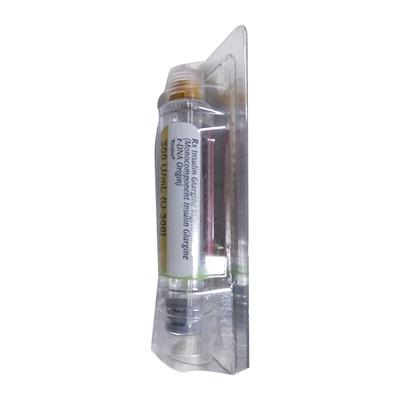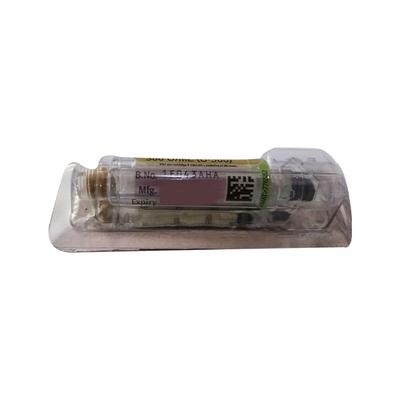

Netmeds First Membership
Quick Links
Introduction About TOUJEO 300 CARTRIDGE
TOUJEO 300 CARTRIDGE contains Insulin glargine, which belongs to the group of medicines called Antidiabetics. It is used in adults to manage diabetes mellitus, a disease where the body does not produce enough insulin to control the level of blood sugar, resulting in high blood sugar levels. Symptoms include increased thirst, frequent urination, extreme hunger, unexplained weight loss, fatigue, irritability, blurred vision, slow-healing sores, frequent infections, and increased ketone levels in urine.
Your doctor might want you to make certain lifestyle changes, like eating a healthy diet, not skipping meals, maintaining your weight, quitting alcohol and smoking, and exercising regularly. Before management, your doctor might want to take certain blood tests to understand your existing condition.
Before receiving TOUJEO 300 CARTRIDGE, inform your doctor if you have low blood sugar, kidney, liver, or heart problems, or diabetic ketoacidosis. Avoid drinking alcohol while receiving TOUJEO 300 CARTRIDGE. Inform your doctor if you are pregnant or breastfeeding before receiving TOUJEO 300 CARTRIDGE. The safety and effectiveness of TOUJEO 300 CARTRIDGE in children have yet to be determined.
The most common side effects of receiving TOUJEO 300 CARTRIDGE are low blood sugar (hypoglycemia), weight gain, and allergic reactions, including reactions at the injection site. If your symptoms do not improve, see your doctor.
Uses Of TOUJEO 300 CARTRIDGE
- To manage diabetes mellitus in adults
How TOUJEO 300 CARTRIDGE Works
TOUJEO 300 CARTRIDGE lowers the blood glucose, facilitated by increased protein synthesis and uptake of glucose, following the binding of insulin to receptors on muscle and fat cells and then inhibiting glucose output from the liver.
How to use TOUJEO 300 CARTRIDGE
TOUJEO 300 CARTRIDGE will be given to you only by a doctor or a nurse under the skin (subcutaneously, usually thighs, upper arm, or abdomen). Your doctor will decide the right dose and duration depending on your age, body weight, and disease condition.
Side Effects Of TOUJEO 300 CARTRIDGE
Common
- low blood sugar (hypoglycemia)
- weight gain
- allergic reactions to skin
- skin thickening or pits at the injection site (lipodystrophy)
Stop receiving TOUJEO 300 CARTRIDGE and contact your doctor immediately if you experience any of the following side effects:
- severe low blood sugar (hypoglycemia) (showing symptoms of dizziness or light-headedness, sweating, confusion, headache, blurred vision, slurred speech, shakiness, fast heartbeat, anxiety, irritability or mood change, and hunger)
- severe allergic reaction (whole body reaction, a rash over your whole body, trouble breathing, a fast heartbeat, or sweating)
- low potassium in your blood (hypokalemia)
- heart failure (symptoms of shortness of breath, swelling of your ankles or feet, sudden weight gain)
- trouble breathing, shortness of breath, fast heartbeat, swelling of your face, tongue, or throat, sweating, extreme drowsiness, dizziness, and confusion
Warning & Precautions
Pregnancy
Consult your doctorIf you are pregnant, think you may be pregnant, or are planning to have a baby, ask your doctor for advice before receiving TOUJEO 300 CARTRIDGE, as it is unknown if it will harm the unborn baby. It will be given only if the benefits outweigh the risk to the fetus and mother.
Breastfeeding
Use with CautionTOUJEO 300 CARTRIDGE should be used with caution in breastfeeding women as it is not known if it is excreted in breast milk. Inform your doctor before receiving this, and the dose will be adjusted by your doctor.
Driving and Using Machines
Use with CautionDo not drive or use machines while receiving TOUJEO 300 CARTRIDGE, as your blood sugar can be low or high and your concentration and ability to react might be affected. Consult your doctor if you have frequent episodes of hypoglycemia.
Alcohol
Consult your doctorAvoid consumption of alcohol while receiving TOUJEO 300 CARTRIDGE, as it can raise or lower your blood sugar levels.
Kidney
Use with CautionTOUJEO 300 CARTRIDGE should be used with caution in patients with kidney disease. Your dose will be adjusted depending on your age, body weight, and disease condition. Consult your doctor before receiving TOUJEO 300 CARTRIDGE.
Liver
Use with CautionTOUJEO 300 CARTRIDGE should be used with caution in patients with liver disease. Your dose will be adjusted depending on your age, body weight, and disease condition. Consult your doctor before receiving it.
Allergy
ContraindicatedBefore receiving TOUJEO 300 CARTRIDGE, inform your doctor if you are allergic to insulin, glargine, or any of the other ingredients in this medicine.
Heart Disease
Use with CautionTOUJEO 300 CARTRIDGE should be used with caution in patients with heart failure, stroke, or other heart problems. Consult your doctor before receiving TOUJEO 300 CARTRIDGE.
Use In Pediatrics
Consult your doctorThe safety and effectiveness of TOUJEO 300 CARTRIDGE in children have not been established yet. Consult your doctor before receiving it.
Use In Geriatrics
Use with CautionTOUJEO 300 CARTRIDGE should be used with caution in patients over 65 years of age. The dose will be adjusted, and regular blood and kidney tests will be conducted. Consult your doctor before receiving TOUJEO 300 CARTRIDGE.
Others
TOUJEO 300 CARTRIDGE is not recommended for use if you:
- have diabetic ketoacidosis
- had an episode of low blood sugar
Interactions
A. Drug-Drug interactions:
Before receiving TOUJEO 300 CARTRIDGE, inform your doctor if you are taking any of the following medicines:
- other medicines for the management of diabetes (metformin, repaglinide, glucagon, pioglitazone, etc.)
- monoamine oxidase inhibitors (MAOI) (used to manage depression) (phenelzine, selegiline)
- medicines used to manage high blood pressure and heart conditions Ex. metoprolol, atenolol, clonidine, guanethidine, reserpine, chlorothiazide, diazoxide, benazepril, captopril, disopyramide
- salicylates (used to relieve pain and lower fever) (aspirin, pentoxifylline, propoxyphene)
- sulphonamides (used to manage infections) (Ex. bactrim, cotrim)
- oral contraceptives (birth control pills like estrogens and progestogens)
- somatostatin analogues (Ex. octreotide)
- glucocorticoids (such as ‘cortisone’ used to manage inflammation)
- thyroid hormones (used to manage thyroid gland disorders)
- growth hormone (medicine for stimulation of skeletal and somatic growth and pronounced influence on the body’s metabolic processes like somatropin)
- danazol (a medicine acting on ovulation)
- niacin used to manage cholesterol levels
- fluoxetine (used to manage depression)
- fibrates (used to lower high levels of blood lipids)
- diuretics (used to manage high blood pressure or excessive fluid retention)
- glucagon (a pancreatic hormone used to manage severe hypoglycemia)
- isoniazid (used to manage tuberculosis)
- phenothiazine derivatives, lithium salts (used to manage psychiatric disorders), and atypical antipsychotic medicines (such as olanzapine and clozapine)
- sympathomimetic medicines (such as epinephrine, salbutamol, and terbutaline used to manage asthma)
- protease inhibitors Ex. darunavir, indinavir (used to manage HIV)
- pentamidine (used to manage some infections caused by parasites)
Overdosage:
TOUJEO 300 CARTRIDGE will be administered to you only by a doctor or a nurse in a hospital, so it is unlikely to receive an overdose. However, consult your doctor or nurse if you experience any unusual symptoms of low blood sugar or hypokalemia (low potassium levels in the blood)
Synopsis
| Drug | : | Insulin glargine |
| Pharmacological Category | : | Antidiabetic |
| Therapeutic Indication | : | Diabetes mellitus |
| Dosage Forms | : |
Injection, Cartridge, Kit, Prefilled pen, Prefilled syringes |
More Information
- Keep TOUJEO 300 CARTRIDGE out of reach of children
- Store in a refrigerator (2-8°C)
FAQs About TOUJEO 300 CARTRIDGE
Q: What is TOUJEO 300 CARTRIDGE used for?
A: TOUJEO 300 CARTRIDGE is used to manage diabetes mellitus in adults, a disease where the body does not produce enough insulin to control the level of blood sugar, resulting in high blood sugar levels.
Q: What should I do if I experience low blood sugar during management with TOUJEO 300 CARTRIDGE?
A: Take glucose tablets or high-sugar snacks (sweets, biscuits, fruit juice) if you experience low blood sugar while taking TOUJEO 300 CARTRIDGE. Measure your blood sugar and rest. Carry glucose tablets or sugar snacks with you in case of emergencies.
Q: Can I receive TOUJEO 300 CARTRIDGE during pregnancy?
A: If you are pregnant, think you may be pregnant, or are planning to have a baby, ask your doctor for advice before receiving TOUJEO 300 CARTRIDGE, as it is unknown if it will harm the unborn baby. It will be given only if the benefits outweigh the risks to the fetus and mother.
Q: Can TOUJEO 300 CARTRIDGE be used in patients with kidney and liver problems?
A: TOUJEO 300 CARTRIDGE should be used with caution in patients with liver and kidney disease. Your dose will be adjusted depending on your age, body weight, and disease condition. Consult your doctor before receiving it.
Q: How does TOUJEO 300 CARTRIDGE work?
A: TOUJEO 300 CARTRIDGE lowers blood glucose levels due to the facilitated uptake of glucose following the binding of insulin to receptors on muscle and fat cells, inhibiting glucose output from the liver. Your doctor might also want you to make certain lifestyle changes, like eating a healthy diet, not skipping meals, maintaining your weight, quitting alcohol and smoking, and exercising regularly.
References
1. KD Tripathi. Insulin, Oral Antidiabetic Drugs and Glucagon. Essentials of medical pharmacology. Eighth Edition. 2019. Page –287.
2. Christopher J. Dunn, Greg L. Plosker, Gillian M. Keating, Kate McKeage & Lesley J. Scott. An Updated Review of its Use in the Management of Diabetes Mellitus. [Revised in September 2012] [Accessed on 23rd January 2024] https://link.springer.com/article/10.2165/00003495-200363160-00007
3. Kate Mckeage, Karen L Goa. A Review of its Therapeutic Use as a Long-Acting Agent for the Management of Type 1 and 2 Diabetes Mellitus [Revised in September 2012] [Accessed on 23rd January 2024] https://link.springer.com/article/10.2165/00003495-200161110-00007
4. Sanofi-Aventis U.S. LLC. U.S Food and Drug Administration. [Revised in February 2015] [Accessed on 23rd January 2024] https://www.accessdata.fda.gov/drugsatfda_docs/label/2015/206538lbl.pdf
5. Insulin glargine. Mayoclinic. [Revised in October 2020] [Accessed on 23rd January 2024] https://www.mayoclinic.org/diseases-conditions/diabetes/symptoms-causes/syc-20371444#:~:text=Diabetes%20mellitus%20refers%20to%20a,brain's%20main%20source%20o
Useful Diagnostic Tests
- HbA1C, Also known as Glycated Hemoglobin, Glycosylated Hemoglobin
- Blood Glucose Fasting (FBS)
- Random Blood Sugar (RBS)
- Post Prandial Blood Sugar (PPBS)
- Insulin-Fasting
- Insulin Postprandial (PP)
- Vital Diabetes Care
- Extended Diabetes Care
- Advance Diabetes Care
- Comprehensive Diabetes Care







